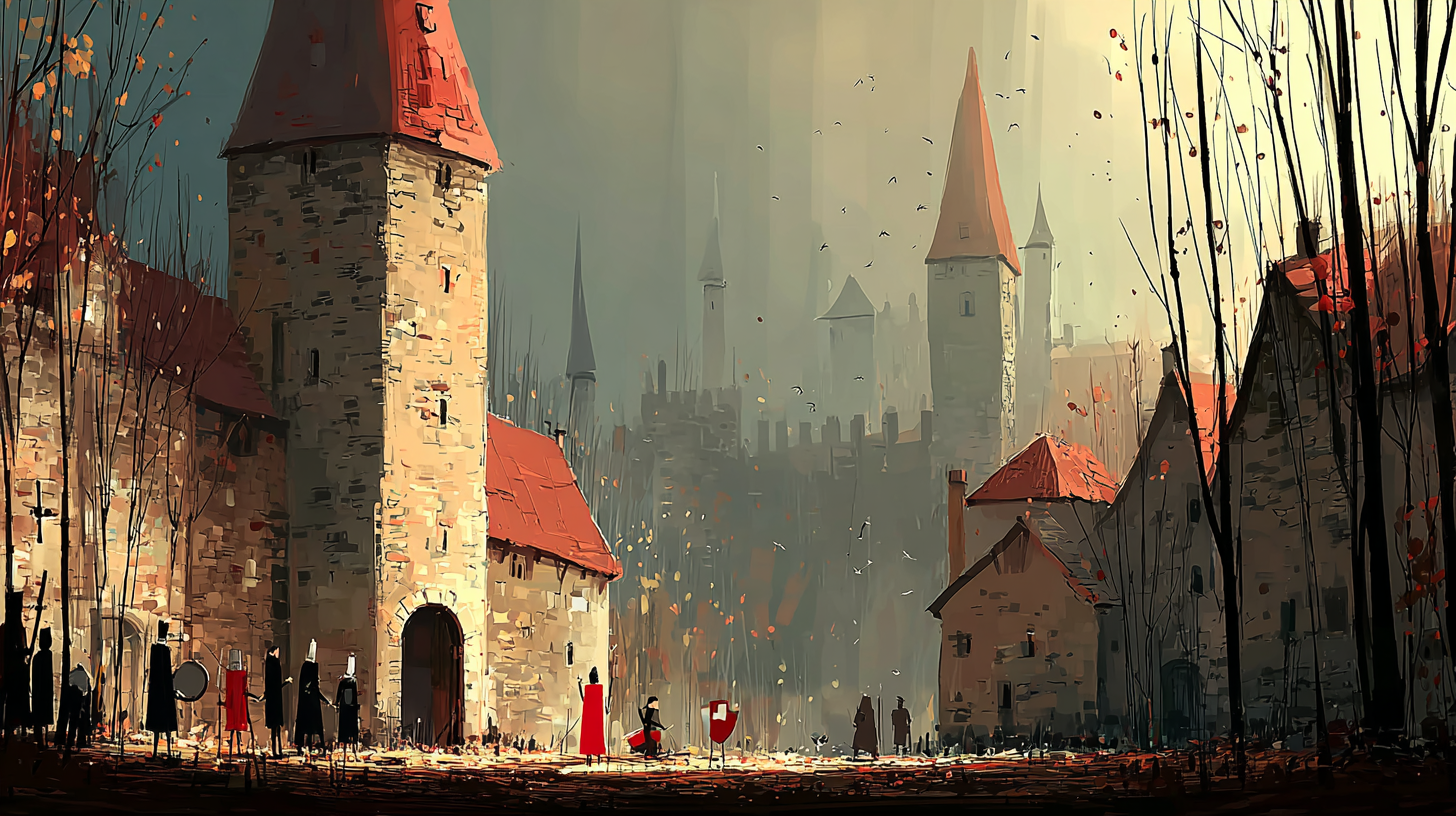“Medieval” means something from the Middle Ages or something old-fashioned.
「medieval」は、中世の時代や古い感じのものを表す言葉です。
以下は英単語 “medieval” に関するストーリー型学習コンテンツです。まずは大枠の意味を理解して最後の文章で確認しましょう。
「medieval」の主な意味(main meaning)
| 品詞 | 意味 | 発音記号(IPA) | 例文 |
|---|---|---|---|
| 形容詞 | 中世の、古風な | /ˌmediˈiːvəl/ | The castle is a well-known medieval building in Europe. |
「medieval」の語源(etymology)
「medieval」はラテン語の medium aevum(中間の時代)に由来します。
これは古代と近代の間の時代=中世(5世紀〜15世紀頃)を指し、「中間の時代」というイメージが核です。
「medieval」の類義語(synonyms)
| 類義語 | 例文 |
|---|---|
| ancient | Ancient ruins were discovered near the city. |
| archaic | The law is considered archaic and needs updating. |
| old-fashioned | She wore an old-fashioned dress to the party. |
| feudal | The country had a feudal system during that time. |
| historic | We visited a historic town in Italy. |
「medieval」の反義語(antonyms)
| 反義語 | 例文 |
|---|---|
| modern | This building has a very modern design. |
| contemporary | The museum features contemporary art. |
「medieval」のコロケーション(collocations)
| コロケーション | 例文 |
|---|---|
| medieval castle | The tourists visited a medieval castle. |
| medieval times | People had different beliefs in medieval times. |
| medieval society | Medieval society was structured around feudalism. |
| medieval history | She is studying medieval history at university. |
| medieval art | The museum displays medieval art and sculptures. |
「medieval」の2項表現(binomials)
| 2項表現 | 例文 |
|---|---|
| knights and castles | Children love stories about knights and castles. |
| sword and shield | The warrior held a sword and shield. |
| lords and peasants | Lords and peasants lived very different lives in medieval times. |
英語ストーリー(english story)
Title: A Medieval Discovery
Emma was on a school trip to a historic town in England. As a student interested in medieval history, she was excited to visit an old medieval castle that had stood for more than 800 years. The tour guide explained how the castle was built during the 13th century and had survived many wars.
Inside the castle, Emma saw medieval art and armor from knights who once protected the castle. She imagined life during medieval times—how people lived in small villages, followed the feudal system, and relied on lords for protection.
Her favorite part was learning about knights and castles. “They had to carry a sword and shield, and train every day,” the guide said. Emma thought it must have been difficult to live without modern technology. “It all sounds so archaic, like something from another world,” she whispered.
Later, at a local museum, she saw an exhibit comparing medieval society with modern life. It showed how people had changed their beliefs and customs. Emma realized that although life was harder in the past, there were many interesting stories to learn.
When she returned to school, she gave a presentation. “Lords and peasants lived very different lives. The medieval period was long, but full of important events,” she said. Her teacher was impressed.
That trip made Emma even more passionate about history.
和訳
タイトル:中世の発見
エマは学校の遠足でイギリスの歴史ある町に行きました。**中世の歴史(medieval history)に興味のある彼女は、800年以上も前に建てられた中世の城(medieval castle)**を訪れることにワクワクしていました。ガイドは、13世紀に建てられ、多くの戦争を生き延びたことを説明しました。
城の中には、**中世の美術品(medieval art)や、かつて城を守っていた騎士の鎧が展示されていました。エマは中世の時代(medieval times)**の暮らしを想像しました。人々は小さな村に住み、**封建制度(feudal)**に従って、領主の保護のもとで生活していました。
エマが一番気に入ったのは、**騎士と城(knights and castles)の話でした。「彼らは剣と盾(sword and shield)を持ち、毎日訓練していたのです」とガイドは言いました。エマは、現代の技術なしで暮らすのは大変だっただろうと思いました。「すごく古風(archaic)**に感じる、まるで別の世界みたい」と彼女はささやきました。
その後、地元の博物館で、**中世の社会(medieval society)と現代(modern)**の生活を比較する展示を見ました。人々の考え方や習慣がどれだけ変わったかがよく分かりました。エマは、昔の生活は大変だったけれど、学ぶ価値のある話がたくさんあると感じました。
学校に戻ったエマは発表をしました。「**領主と農民(lords and peasants)**はまったく違う生活をしていました。中世の時代は長かったけれど、重要な出来事がたくさんありました」と語りました。先生はとても感心していました。
その旅行で、エマはさらに歴史への情熱を深めました。
「medieval」のQ&A
- Qmedievalとancientの違いは何ですか?
- A
どちらも「昔の時代」を表しますが、”ancient”はエジプトやギリシャのような「古代(紀元前)」を指すことが多く、”medieval”は「中世(約5〜15世紀)」を意味します。
- Qarchaicとmedievalは同じ意味ですか?
- A
部分的には似ていますが、”archaic”は「時代遅れ・古風」という意味が強く、”medieval”は「中世の」という具体的な時代を示す形容詞です。
- Qfeudalはどんなときに使いますか?
- A
“feudal”は「封建制度に関する」という意味で、中世の社会構造(領主と農民)を説明するときによく使います。”medieval”と一緒に使われることが多いです。
- Qmedievalの反対語は何ですか?
- A
“modern”(現代の)や “contemporary”(同時代の・現代の)が反対語になります。中世に対して、現代の生活や技術を表す時に使います。
- Qmedieval castleとは何ですか?
- A
“medieval castle”は「中世の城」を意味します。騎士や領主が住んでいた石造りの城で、ヨーロッパ各地に現存しています。
- Qmedieval timesはどんな意味ですか?
- A
“medieval times”は「中世の時代」という意味です。歴史の中でも、古代と近代の間にあたる時代を指します(5〜15世紀頃)。
- Qmedieval societyはどんな社会ですか?
- A
“medieval society”は「中世社会」のことです。身分制度や宗教が強く影響し、封建制度のもとで人々が生活していた社会構造を指します。
- Qmedieval artとは何ですか?
- A
“medieval art”は「中世美術」のことです。宗教的な絵画や彫刻が中心で、ゴシック様式などが特徴です。
- Q“lords and peasants”はどういう意味ですか?
- A
“lords and peasants”は「領主と農民」という意味で、中世の階級社会を表す典型的な表現です。封建制度の中心的な関係を示します。
medieval / ancient / archaic / feudal / historic / old-fashioned の違い
| 単語 | 意味 | ニュアンス | 例文 |
|---|---|---|---|
| medieval | 中世の(5〜15世紀頃) | 歴史的・文化的な中世時代を指す | We visited a medieval castle in France. |
| ancient | 古代の | エジプト・ギリシャなど紀元前の時代 | Ancient Rome influenced modern culture. |
| archaic | 古風な・時代遅れの | 使われなくなったもの・古臭い考え | The law is archaic and needs reform. |
| feudal | 封建的な | 領主と農民の関係を中心に説明 | Medieval Europe had a feudal system. |
| historic | 歴史的に重要な | 時代や場所に関係なく重要性を強調 | It was a historic event for the country. |
| old-fashioned | 時代遅れの | 現代では古臭く感じる | His views on marriage are old-fashioned. |



コメント